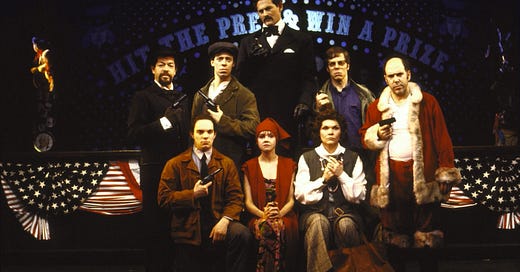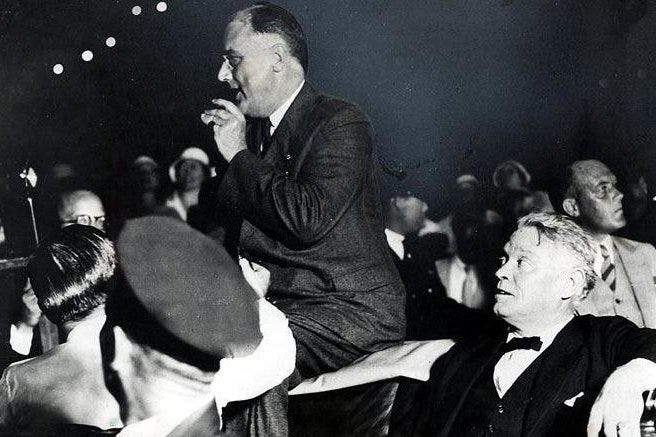It is February 15, 1933. In Bayfront Park, Miami, Franklin D. Roosevelt sits on the lowered canvas roof of a green Buick convertible. In less than three weeks, he will become the 32nd president of the United States. Among the 25,000 people who have gathered to hear Roosevelt speak is a slight man in his early thirties by the name of Giuseppe Zangara. He stands 25 feet away from the president-elect. He is armed with a .32-caliber revolver.
Zangara listens to Roosevelt’s remarks in full before pulling the trigger. He fires a total of five times, shooting five people—but he fails to hit his intended target. Despite his proximity to Roosevelt, Zangara’s efforts are thwarted by a combination of his own height, which necessitates his precarious vantage point atop a folding chair, and the swift intervention of a handful of bystanders. One of those he does shoot, however, is Chicago Mayor Anton Cermak. Cermak will die 19 days later, due in part to his wounds. Zangara, consequently, is sentenced to death.
“How I Saved Roosevelt” cross-cuts between the immediate aftermath of the attempt on the president-elect’s life and Zangara’s own final moments in the electric chair. The number occurs early in Assassins, but it can perhaps best be understood through the lens of an exchange which takes place much later in the show.
“That’s America.” So says John Wilkes Booth to Lee Harvey Oswald, towards the end of Assassins. “The Land Where Any Kid Can Grow Up To Be President. The Shining City, Lee. It shines so bright you have to shade your eyes.” We find the two men on the sixth floor of the Texas School Book Depository. The date is November 22, 1963. Booth, having described one America, proposes another. “In here,” he says, “this is America, too.” This is the America of the assassins—but it is also, to varying extents, the America of countless others as well. It is the America of dark urges and dashed hope, an America whose dream seems impossibly distant, a shining city on a hill too steep to climb. Booth, impelling Oswald to action, sums up this America by quoting Henry David Thoreau. “The mass of men lead lives of quiet desperation,” he says, assassin to assassin—and it lands.
One way to think about Assassins as a whole is as a study of these two Americas. In Sondheim’s hands, each is treated with equal nuance and care: the shining city is not without its shadows, and the dark room is not devoid of light. “How I Saved Roosevelt” presents us with both of these Americas, side by side.
We hear first from five eyewitnesses to the shooting, each keen to take center stage in this particular story. These bystanders sing to an only slightly altered rendering of the John Philip Sousa march, “El Capitan.” This is a particularly effective conceit, the aural equivalent of wrapping these characters in an all-American flag. This, after all, is the march that was performed as Admiral Dewey’s warship set sail for Manila during the Spanish-American War, and indeed at the subsequent victory parade in New York City. “El Capitan” was also the very tune that was playing as Roosevelt’s car arrived in Bayfront Park, on that almost-fateful Miami night.
The first three bystanders tell their stories breathlessly, each flushed with pride at having personally saved the life of the president-elect—or so they would have us believe. These eyewitnesses claim in turn to have impeded Zangara’s physical proximity to his target (“I say, ‘Move to the back!,’ which he does with a grunt—”); his line of sight (“He says he can’t see, I say, ‘Find a lap and go sit on it!’”); and his grip on the gun itself (“So I pushed it as hard as I could in the air—!”). Bystanders #4 and #5, meanwhile, are a married couple on vacation. They are delighted simply to have witnessed such drama first-hand:
BYSTANDER #5
I was saying to Harold, “This weather is bliss!”BYSTANDER #4
When you think that we might have missed seeing him miss—!BOTH
Lucky we were there!BYSTANDER #5
It was a historical event—BYSTANDER #4
—worth every penny that we spent!
The words “Lucky I was/we were there” act as a refrain of sorts throughout this number. The above example is not the first time these words feature in this number, but they acquire a new meaning here. For the initial trio of bystanders, the implication of this phrase is simply lucky we were there to save Roosevelt. Slightly overblown though their individual claims may be, this seems a perfectly reasonable sentiment from their own adrenaline-fueled perspective. Here, though, the sense of the line is closer to lucky we saw the show, and had such a good view. And, with an eye to Assassins’ framing device of a fairground shooting gallery, Sondheim shows us how easily violence can become little more than just another attraction. Danger becomes a diversion; incidents are merely incidental.
Amidst such feverish excitement, our first sight of Zangara himself is a sobering one. He is strapped into the electric chair in which, minutes later, he will die. It is as if we have slipped from the first of Booth’s Americas to the second: outside, the shooting’s giddy aftermath; inside, its weighty consequence. The effect is chilling. A kind of musical coarsening takes place. We have entered a harsh new terrain: more sparse, barren even. Crucially, though, the actual tempo does not change. Soon, as Zangara continues to tell his story, a version of the former march seems to stutter back to life. The march continues to sound, but it is heard as if from somewhere distant, alien to Zangara; then, as it resumes in earnest, it seems to overwhelm him, a parasite consuming its host. Later in Assassins, there is mention of “the muffled drums, the muffled dreams.” These are said to form part of “another national anthem”—in other words, the anthem of Booth’s second America. Here, long before it is labeled as such, I believe we hear that anthem beginning to sound.
Prior to this number, the assassin we have spent the most time with is the loquacious, eloquent Booth. We have also had our first taste of Charles Guiteau (President Garfield’s assassin), an ebullient figure who speaks with fluency, flair, and a generous dollop of self-importance. Zangara makes for quite a contrast with both of these men. His speech is terse, his English broken, and his assessment of the world seems a profoundly nihilistic one: “No hope. No fair. Nowhere.” The figure who now confronts us is no high-minded zealot, nor is he an affable raconteur. Here, instead, is a broken man. Zangara defines himself by that which he is not, expressing what he has in terms of that which he lacks. He does, however, take particular exception to the bystanders’ framing of him as a foreigner:
Zangara no smart, no school,
But Zangara no foreign tool,
Zangara American!
American nothing!
Later in Assassins, during his conversation with Oswald, Booth will reach for another quotation, this time from Arthur Miller. “Attention must be paid,” he says, echoing Linda Loman’s words in Death of a Salesman. As the end of “How I Saved Roosevelt” approaches, the five bystanders find themselves fleetingly famous; their pictures are on the front pages of newspapers, their names in proverbial lights. Attention has been paid. But for Giuseppe Zangara, American Nothing, there are no photographers. This, for him, is the final insult. As one America performs to a packed house, the other screams into a void.
Listening links:
Three versions of Assassins are widely available: the original 1991 off-Broadway cast recording; the 2004 Broadway production; and the most recent (2021-22) off-Broadway version. The three Zangaras are, respectively, Eddie Korbich (who also played Tobias in the first Broadway revival of Sweeney Todd), Jeffrey Kuhn, and Wesley Taylor (who fans of Only Murders in the Building will recognize as season three character Cliff DeMeo, producer of Oliver’s Broadway show).
Here’s the original version:
Here’s 2004:
And here’s 2022:





